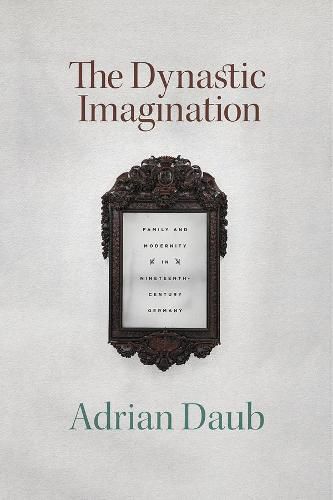Readings Newsletter
Become a Readings Member to make your shopping experience even easier.
Sign in or sign up for free!
You’re not far away from qualifying for FREE standard shipping within Australia
You’ve qualified for FREE standard shipping within Australia
The cart is loading…






Adrian Daub’s The Dynastic Imagination offers an unexpected account of modern German intellectual history through frameworks of family and kinship. Modernity aimed to brush off dynastic, hierarchical authority and to make society anew through the mechanisms of marriage, siblinghood, and love. It was, in other words, centered on the nuclear family. But as Daub shows, the dynastic imagination persisted, in time emerging as a critical stance by which the nuclear family’s conservatism and temporal limits could be exposed. Focusing on the complex interaction between dynasties and national identity-formation in Germany, Daub shows how a lingering preoccupation with dynastic modes of explanation, legitimation, and organization suffused German literature and culture.
Daub builds this conception of dynasty in a syncretic study of the literature, sciences, and history of ideas into the twentieth century. As early modernism discovered a standpoint from which to critique the nuclear family, remnants of dynastic ideology kept their hold variously on Richard Wagner, Emile Zola, Stefan George, and Sigmund Freud. At every stage of cultural progression, Daub reveals how the relation of dynastic to nuclear families inflected modern intellectual history.
$9.00 standard shipping within Australia
FREE standard shipping within Australia for orders over $100.00
Express & International shipping calculated at checkout
Adrian Daub’s The Dynastic Imagination offers an unexpected account of modern German intellectual history through frameworks of family and kinship. Modernity aimed to brush off dynastic, hierarchical authority and to make society anew through the mechanisms of marriage, siblinghood, and love. It was, in other words, centered on the nuclear family. But as Daub shows, the dynastic imagination persisted, in time emerging as a critical stance by which the nuclear family’s conservatism and temporal limits could be exposed. Focusing on the complex interaction between dynasties and national identity-formation in Germany, Daub shows how a lingering preoccupation with dynastic modes of explanation, legitimation, and organization suffused German literature and culture.
Daub builds this conception of dynasty in a syncretic study of the literature, sciences, and history of ideas into the twentieth century. As early modernism discovered a standpoint from which to critique the nuclear family, remnants of dynastic ideology kept their hold variously on Richard Wagner, Emile Zola, Stefan George, and Sigmund Freud. At every stage of cultural progression, Daub reveals how the relation of dynastic to nuclear families inflected modern intellectual history.